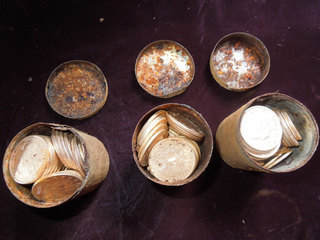There’s been no shortage of stories over the past 10 years about information technology and the law, and how new toys and gadgets will change the face of it all. This is easier, that is easier, blah, blah blah.
Missing from those “tech is great” stories is this little nugget: Sometimes there’s nothing wrong with the old ways.
Two stories this week bring that concept into sharp focus. The first is the implosion of Mt. Gox, the the world’s largest exchange for trading bitcoins, a virtual currency that is backed up only, it seems, by the willingness of others to believe in it. 750,000 bitcoins have gone missing worth, on a good day, about $300M. Why anyone would be surprised that an unregulated digital “currency” backed up only by faith might have problems is beyond me.
Because hacking and digital theft don’t really exist, I guess.
And the second story is the discovery by a California couple of eight cans holding 1,400 gold coins in mint condition. Preliminary estimates put the find at about $10M. The newest of the coins are 120 years old, minted in 1894. Gold coins have been used as currency for thousands of years.
Bitcoins and gold coins. A very interesting pairing of stories.
The newest tech gadgets might, in fact, make some lawyering easier. You can bring your whole file to court, to the house or elsewhere on an iPad. That certainly can be convenient, and also serve to make sure you are now working 24/7.
But proceed with caution. Just because a technology is new doesn’t mean it is better.


The “front story” of the found gold is fascinating enough. But what about “the back story”?
Who buried them in the first place and then forgot about them, or died without leaving a trace? Were they honestly come by or is it part of a horde of stolen swag? Will someone crawl (furtively?) out of the woodwork to claim that they once belonged to his great-great-grandfather — and try to “prove” it with tea-stained parchment?
And how many script pitches are being made in production offices right now about all this?
Mediocre minds want to know.
Who doesn’t love a good mystery? Making a good movie, however, is another matter….
UPDATE!
Looks like it was buried swag after all.
http://gma.yahoo.com/10m-gold-coin-hoard-found-yard-may-stolen-141317823–abc-news-personal-finance.html?vp=1
So, the Treasury may have the tea-stained parchment. But, the “finder’s fee” might be nice.
So much for the feature film. Would you settle for 1/2 hour on the (so-called) History channel?
Well, they would still need to prove these coins are the stolen ones. How are they going to do that?
But fear not, for even if the gov’t can’t get a piece of the action directly, there are always the taxes that have to be paid on the find.